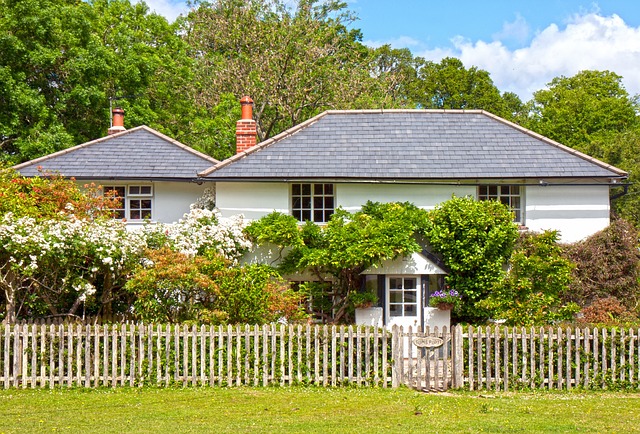In the quest for outdoor privacy, a well-installed fence can transform your New Bedford, MA, space. This article guides you through the comprehensive process of adding a privacy fence, from understanding its benefits and exploring various types to navigating local regulations. We delve into the ideal reasons to choose New Bedford for installation, offering insights on site preparation and the step-by-step installation process. Additionally, we provide post-installation care tips and shed light on essential permits, ensuring your new fence enhances your property seamlessly and legally.
- Understanding Privacy Fences: Benefits and Types
- Why Choose New Bedford for Installation?
- Site Assessment and Preparation Steps
- The Installation Process: From Start to Finish
- Post-Installation Care and Maintenance Tips
- Local Regulations and Permits: What You Need to Know
Understanding Privacy Fences: Benefits and Types
Privacy fences serve as more than just barriers; they are essential additions to any outdoor space, offering a multitude of benefits tailored to individual needs. From blocking unwanted views and providing secure play areas for children to serving as natural sound barriers against traffic noise, these fences significantly enhance outdoor comfort and enjoyment. Moreover, they contribute to property value by creating a sense of exclusivity and security.
When considering privacy fence installation in New Bedford, MA, it’s crucial to understand the various types available, each with its own advantages. Options range from traditional wooden fences, known for their timeless aesthetic appeal, to modern vinyl fences that require minimal maintenance while offering exceptional durability. Chain-link fences provide a balance between security and visibility, making them suitable for areas requiring surveillance while still preserving some level of privacy. The selection depends on factors like desired aesthetics, budget, and specific privacy and security requirements.
Why Choose New Bedford for Installation?
New Bedford, MA, is an ideal location for privacy fence installation for several reasons. The city’s vibrant community and diverse landscape offer a unique blend of urban charm and natural beauty, making it a desirable place to call home. With its well-maintained parks, scenic waterfront, and bustling downtown area, New Bedford provides the perfect backdrop for enhancing your outdoor space with a private fence.
The city’s strategic location also offers easy access to major transportation routes, ensuring convenience for both residents and contractors alike. This accessibility, coupled with the local community’s pride in their homes and neighborhoods, makes New Bedford an attractive choice for those seeking to invest in privacy fencing solutions.
Site Assessment and Preparation Steps
Before installing a privacy fence in New Bedford, MA, a thorough site assessment is crucial. This involves evaluating the landscape, measuring the area to be fenced, and identifying any potential challenges like trees, utilities, or slopes. The preparation process begins with clearing the designated fence line of debris and vegetation, ensuring there’s adequate space for posts and panels. It may also include digging holes for the fence posts, based on soil conditions and local regulations.
During preparation, it’s important to check local building codes and obtain any necessary permits to ensure compliance. Marking out the fence line accurately ensures the final installation aligns with your vision. Proper site assessment and meticulous preparation lay the foundation for a well-built, durable privacy fence that enhances your New Bedford property for years to come.
The Installation Process: From Start to Finish
The installation process for a privacy fence starts with a thorough site evaluation. Our expert team assesses your property, considering factors like layout, existing structures, and local regulations to ensure compliance. Based on this assessment, we create a customized plan tailored to your specific needs and preferences.
Next, we prepare the ground, marking out the fence’s location accurately. This involves clearing any debris or obstacles and leveling the area. The actual installation begins with the posting of wooden posts at strategic intervals, ensuring stability and durability. After the posts are set, horizontal rails are securely fastened, followed by the paneling—the privacy panels that will block unwanted views. Finally, we add the finishing touches, such as gates or latticework, to complete the fence and provide you with the privacy and security you desire.
Post-Installation Care and Maintenance Tips
After your privacy fence is installed, regular care and maintenance will ensure its longevity and beauty. Start by sweeping or brushing off any dirt or debris that accumulates on the fence regularly. Use a soft brush or vacuum with a delicate setting to avoid damaging the fence’s surface.
Inspect your fence periodically for any signs of wear, such as loose posts, cracked panels, or damaged hardware. Address these issues promptly to prevent further damage. Light cleaning with a mix of mild soap and warm water can help maintain the fence’s finish. Avoid using harsh chemicals or power washers, which could strip away the protective coating or damage the material.
Local Regulations and Permits: What You Need to Know
When considering a privacy fence installation in New Bedford, MA, it’s crucial to familiarize yourself with local regulations and permits. These guidelines are in place to ensure that any construction or modification to your property aligns with safety standards and neighborhood aesthetics. The first step is to contact the relevant local authority or building department to inquire about specific rules and requirements for fence installations. This process often involves submitting an application, providing detailed plans of the proposed fence, and potentially paying a fee.
Obtaining the necessary permits is essential as it allows your project to comply with all legal requirements. Regulations may cover aspects such as fence height restrictions, material choices, and the distance a fence can be from property lines. By understanding these regulations, you can ensure that your privacy fence not only serves its intended purpose but also adheres to local laws, potentially avoiding future fines or construction disruptions.
